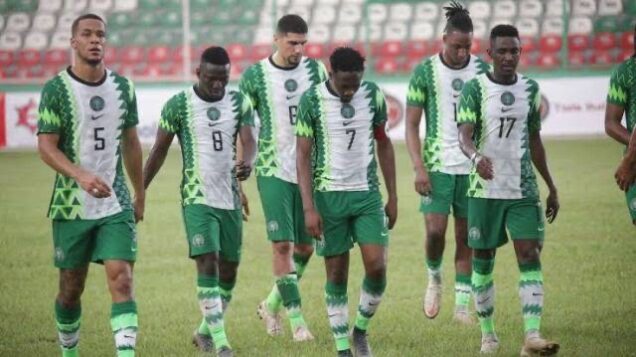Super Eagles and that disappointing show
When it rains in Nigeria, it pours. On 29th March 2022, for the second time in three months, the Super Eagles of Nigeria served Nigerians a sour supper of disappointment and disillusionment when they stumbled to an insipid defeat against the Black Stars of Ghana in the final qualifying round of the Qatar 2022 World […]

Super Eagles
When it rains in Nigeria, it pours. On 29th March 2022, for the second time in three months, the Super Eagles of Nigeria served Nigerians a sour supper of disappointment and disillusionment when they stumbled to an insipid defeat against the Black Stars of Ghana in the final qualifying round of the Qatar 2022 World Cup at the Moshood Abiola National Stadium, Abuja.
Having defied hostile conditions to secure a creditable 1-1 draw against the same opponents in Kumasi, Ghana, on 25th March 2022, the expectation was fever-pitch that the Black Stars would finally be dimmed in the “Jollof derby” between two of West Africa’s premier footballing powerhouses.
- Lack of unity biggest challenge in Kannywood – Baba Musa
- As rainy season begins, Niger IDPs want to return home
With thousands of Nigerians who had travelled from far and near to cheer the Super Eagles, it took all of eleven minutes for some calamitous goalkeeping from Nigerian goalkeeper Francis Uzoho to gift Ghana the goal that ultimately sent them to the World Cup. The disappointment has been debilitating to put it mildly.
Sports can be such powerful therapy. Historically and universally, sports has shown again that it possesses a treasure trove of therapeutic. In a country like Nigeria, torn apart by ancient divisions, sports has always offered a common ground, a kind of truce in Nigeria’s war against perceived enemies within.
On a night that many Nigerians would remember for leaving a brutal vacuum in Nigeria’s sporting history, events elsewhere seemingly seeped into the pitch and bones of the Super Eagles to leave Nigeria staring at the prospect of looking in from the outside while vastly inferior sporting countries participate at the World Cup, for the first time since Angola sensationally pipped the country to the ticket in 2006.
As the Super Eagles huffed and puffed to no avail against the Black Stars, many of the builders of the brick wall they butted their heads against were pitchside or sat in the stands. As Nigerian dreams crumbled on that humid night in Abuja, the architects of many a Nigerian problem watched on.
In 2006, Mr Austine Eguavoen drew from the breakout stars of Nigeria’s second-place finish at the U-20 World Cup in Holland in 2005, melded them with established and experienced stars and successfully guided Nigeria to a third-place finish at the African Cup of Nations in Egypt. It remains his only achievement of note in charge of the national team.
Yet, when in December 2021, the Nigeria Football Association indulged the toxicity of its delusions and muddled thinking to wield the axe on Gernot Rohr, the German coach, who successfully guided the country to the 2018 World Cup, and a third-place finish at the African Cup of Nations the following year, it was Mr. Eguavoen that was summoned to the role.
In the wake of Nigeria’s failure, some Nigerians have argued almost jubilantly that qualifying for the World Cup would have papered over the cracks of the myriad challenges strangling the country at the moment. But by celebrating failure, they completely missed the point.
It serves to remember that sports is an equalizer, an elixir of undoubted efficacy. Its ability to positively distract as well as heal has been proven again and again over the years. Many countries reeling from internal turmoil and international scrutiny have successfully turned to sports for catharsis and the results have been overwhelmingly positive.
With Nigeria confronting a mountain of problems at the moment, a besieged country can do with sporting triumphs even as its beleaguered citizens should do well to refrain from romanticizing adversity and failure.
In the wake of this failure, Nigeria must pick up the pieces and start again. But those who cannot pick up the pieces because their fingers have been rendered too tender by complacency, complicity and corruption must be cast into the wilderness of disuse.
Kene Obiezu writes from Abuja
